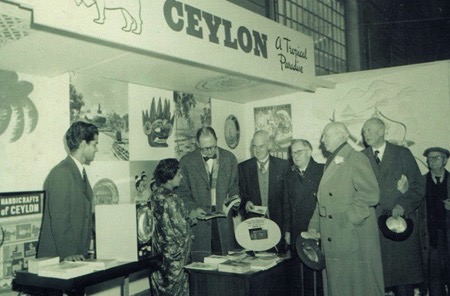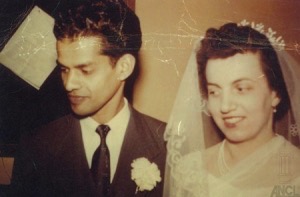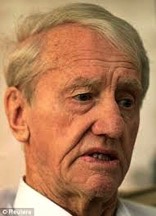LIFE ABROAD – Part 113 EMBASSY NUPTIALS
Posted on January 14th, 2015
Dr.Tilak Fernando
After glancing through a recent Sunday newspaper article on a new resolution adopted by the 193 member UN General Assembly surrounding the mysterious plane crash that took place as far back as in 1961 in which the Swedish born UN Secretary General Dr. Dag Hammarskjöld perished with another 15 members of the team, my good friend Peter Wijesinghe came out with some fascinating information enriching the news report linking the late Dr. Neville Kanakaratne, former Sri Lankan Ambassador.
Dr. Dag Hammarskjöld had been a legal adviser to the UN Special Representative in Congo, who was subsequently assigned as the political and legal adviser to the Commander of the UN Emergency Force in the Middle East in the early 1960.
Dr. Neville Kanakaratne was attached to the Attorney General’s office in Colombo; later he served as the Sri Lanka’s envoy in three major capitals – Washington, New Delhi and Moscow. In early eighties he was attached to the Sri Lanka High Commission in London as ‘Minister’. He joined the UN Secretariat on the personal invitation of Dr. Dag Hammarskjöld
Providence
A stroke of fortune managed to save Neville Kanakaratne’s life on this ominous day when the ill-fated plane carrying Dr. Dag Hammarskjöld crashed with his entire team of advisers numbering fifteen. Dr. Neville Kanakaratne’s inability to converse in French made Dr. Dag Hammarskjöld to substitute him with a Frenchman as an adviser to conduct certain peace negotiations during his intended mission with a separatist group in Congo. Providence made Dr. Neville Kanakaratne to stay back while a French adviser took his place during that ill-omened air journey.
UDI and disappearances
Recalling this incident vividly, Peter Wijesinghe says it was a period when the CIA was very active and Ian Smith of Rhodesia declared UDI (Unilateral Declaration of Independence) while many leaders in Africa, Asia and in the Middle East began to disappear either by assassination or other means.
Ian Smith
Quoting leaders such as Patrice Lumumba, Mohammad Musadaqe in Persia, Mohammad Ben Bella in Algeria, Tafava Baleva in Nigeria and so many others, he says people at that time were inclined to believe in some kind of an evil force behind such occurrences”. Sighting another similar conspiracy to kill Prime Minister Chu En Lai of China, he describes how the Chinese Prime Minister escaped death by being clever and changing aeroplanes.
My purpose in writing to you about this is because Dr. Kanakaratne’s name was mentioned in the Sunday newspaper article. I had the privilege of serving under Dr. Kanakaratne at the Sri Lanka High Commission in London and can say what a respectable officer and a thorough gentleman he was. It would be appropriate to describe his character by quoting the Sinhala proverb: Ma wani dilinda wara wara langata kanda, duk sapa kumanda, asana nirido wena koinda”(who will call upon a poor man like me and enquire about my well being)? Dr. Kanakaratne was one of the supreme ambassadors Sri Lanka ever produced. In 1978 George Washington University in the USA conferred the honorary degree of Doctorate of Laws to Neville Kanakaratne.
Personal experience
The writer could agree one hundred percent with Peter Wijesinghe’s description of Dr. Neville Kanakaratne’s unassuming and superlative qualities from his own personal experience when he encountered a crucial situation with regard to his student visa to stay in Britain when he changed his course of studies without informing the Home Office.
Dr. Neville Kanakaratne, attached to the Sri Lanka High Commission in London at the time in the capacity of ‘Minister’ had just returned from New York after an official visit when he heard about the writer’s visa disorder and the way the late acting High Commissioner Mr. Pathmanathan was twiddling his thumbs at a decisive juncture! The High Commission office took a keen interest on the writer’s case at the time due to his wife working at the Mission as a senior secretary to the Education officer.
Dr. Neville Kanakaratne having heard of the problem wasted no time in calling his secretary (Maureen) and instructed her to fix an appointment for him to meet with the Under Secretary of State at the Home Office. This kind of action was regarded as very unusual to expect, both from the point of view of the Home Office and that with the High Commission, but in Dr. Neville Kanakaratne’s mind it was based purely on humanitarian grounds.
Within minutes Secretary Maureen came with a beaming smile and informed Dr. Neville Kanakaratne about the fixed appointment for the following day with the Under Secretary. The meeting that took place between Neville Kanakaratne and Under Secretary Fitzgerald managed to iron out the problem and enabled the writer to continue his studies in the UK.
Marriage réception
Normally the general public does not come to hear about marriage receptions of Sri Lankans held in Sri Lankan embassies or High Commissions often. May be not at all, except in certain cases some Sri Lankans living abroad wish to get their marriage registered officially, although it is not absolutely necessary once a marriage is registered at a Registrar of Marriages in that particular country.
The writer was holidaying in Milan once when he experienced one such incident as the host he was staying with had to be the Best Man to a friend, and the marriage ceremony had been arranged at the Sri Lanka embassy in Rome.
London
In a completely different routine, and going back to over five decades, the marriage that took place in London on the 27 of April 1958, between Peter Wijesinghe and his German bride Hannah Worschech had been quite a distinctive one too!
As a young bachelor Peter Wijesinghe was living at the time in the High Commission building itself, at 13, Hyde Park Gardens, London West 2. He was perhaps the only member of staff who was privileged to hold a wedding reception in the ballroom of the High Commission so far.
First world travel exhibition

High Commissioner at the time, the late Mr. Gunasena De Soyza, graced the occasion with his wife, where there were three hundred guests including members of the High Commission staff, (home based, the local recruits as well as the diplomatic officers). The late Professor J. L. C. Rodrigo proposed the toast while the Deputy High Commissioner K. Kanakasundaram, T. D. Perera and many others delivered stimulating speeches.
The reception and merry making went on till late hours of the evening and the High Commissioner congratulated the newly wedded couple before he left the ballroom. Peter and Hannah went on their honeymoon and Peter returned back to work after a week’s vacation to be called up by the High Commissioner to his office, which baffled him with a strange question the High Commissioner put to him.
Peter, did you get permission from the Foreign Ministry prior to your getting married to a foreign lady…..? I am advised that any member of staff attached to a High Commission or an Embassy abroad wishing to do so should seek permission from Colombo first, before one embarks on such matters”.
Peter innocently answered in the negative and explained that he had never come across such a circular. On the following day, the High Commissioner called Peter once again to his office and advised him that he should, in fact, have obtained prior permission from the Foreign Ministry in Colombo and what he did was improper!
However, Peter states, as far as he was concerned, it was the end of the story, but the High Commissioner Gunasena Soyza subsequently went back to Ceylon and issued a ministry circular stating that ‘any Sri Lankan citizen working in any of the Sri Lanka Missions abroad wanting to marry a foreigner should obtain prior approval from the Ministry of Foreign Affairs’.
His marriage in London has given rise to a new regulation where any Sri Lankan Foreign Ministry staff working in an Embassy or a High Commission abroad should obtain prior approval from the Ministry before they make any arrangements to marry a foreigner!
Following this incident Peter recollects how the late S. C. A. Nannayakkara and R. C. S. Koelmeyer got married to foreign ladies after obtaining permission from the Foreign Ministry; also he recalls a rare case where Head of a Mission’s request was turned down to marry a foreign lady.
Gamini Windsor, who had been the London Correspondent for Lake House at the time, too had attended the wedding reception of Mr. and Mrs. Wijesinghe; the attached photograph of the young new couple taken by Gamini Windsor had appeared in the Sunday Observer consequently.
The other photograph here refers to the first World Travel Market held at the Royal Pavilion, Brighton at a time Sri Lanka was at infant stages of promoting tourism industry to Sri Lanka. Peter Wijesinghe is seen here with the Mayor of Brighton and a lady from the Ceylon tea centre, representing Ceylon, through the High Commission in London.
–

